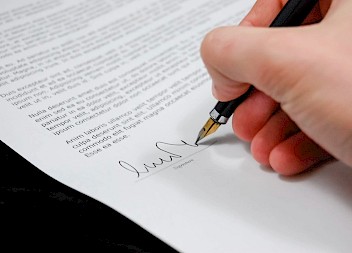If you have been asked to sign a document by your solicitor, such as a Witness Statement for Court proceedings, then it will usually have a Statement of Truth at the end of it.
What Is a Statement of Truth?
A Statement of Truth (sometimes known as a declaration of truth) is a way for an involved party to confirm that the information contained within a document is correct, to the best of their knowledge. Documents that may require a Statement of Truth include:
- Proof of evidence
- Witness statements
- A statement of case (court documents)
- Schedule of Financial Losses
This list is not exhaustive – your solicitor will guide you through any documents or Statements of Truth you are required to sign.
What are the implications of signing a Statement of Truth?
The statement is a declaration that the person signing the document does so with the honest belief that the content of the document is correct. It is essential that you do believe the content of the document to be accurate and truthful when you sign a Statement of Truth as, in the UK, lying on a witness statement or other court document can find you in contempt of court.
It is also important that you consider that your evidence contained in a Statement has been expressed in your own words, the way you would say it, rather than anyone having ‘put words in your mouth’.
Why is a Statement of Truth Important?
Without a Statement of Truth, key evidence documents could be disregarded as unusable, which could have a significant impact on your case.
Statement of Truth Examples
In Court documents, the Statement of Truth will read as:
“I, [name], believe the facts stated in these [name of document] are true”.
On a witness statement, a Statement of Truth will usually appear in two parts, within the body of the document:
“The matters referred to in this witness statement are within my knowledge except where stated otherwise.”
and, usually at the end of the document:
“I believe that the facts stated in this witness statement are true”.
Changes to wording from April 2020
On the 6th April 2020, the Civil Procedure Rules were updated, and the form of the statement of truth verifying a statement of case, a response, an application notice, a certificate of reasons or a notice of objections must now include the following sentence:
“I understand that proceedings for contempt of court may be brought against anyone who makes, or causes to be made, a false statement in a document verified by a statement of truth without an honest belief in its truth.”
Furthermore, the changes set out a requirement that the form of a statement of truth verifying a witness statement should be provided in the language of the witness, as well as including the above addition. The Statement of Truth must also be dated with the date on which it was signed.
Statements of Truth should be provided in the witness’s language alongside an English translation, with the process of the statement’s preparation and the date of translation included.
Who can sign a Statement of Truth?
There are certain rules about who can sign a Statement of Truth, and it depends on what the statement is referring to. In most cases, the Statement of Truth should be signed by the relevant party/witness. In certain situations, your legal representation (solicitor) may be able to sign on your behalf, or a litigation friend if necessary.
What you should know before signing
- Make sure you have read the document in full, and that you both understand it and honestly believe that everything it says is true in your own words. Make sure nobody has led your statement or amended its content.
- Your Statement of Truth may not reflect the full, definitive facts of the case – and that’s okay. The statement is a reflection of what you have perceived and understood to be true, and why. However, all of the facts must be correct to the very best of your knowledge.
- When writing your witness statement (or when your solicitor is writing it with you), the facts should be presented as your experience and why you believe it to be true, rather than what definitively happened. So, rather than saying, ‘the nurse failed to report my bleeding to the doctor’, you might phrase it as, ‘I was not aware of the nurse reporting my bleeding to the doctor, as he did not mention it when he came back into the room’.
- Typically, you will need to sign a Statement of Truth as well as printing your full name and adding the date of signing.
What happens if someone lies in a Statement of Truth, or signs a statement they believe to be inaccurate?
Solicitors have a professional duty not to mislead the Court. If it came to light that part of your evidence was not accurate, we would not be able to submit this information to the Court as we would be in breach of our professional obligations.
If a Court decided that you did not have an honest belief in the accuracy of your statement when you signed a Statement of Truth or when you swore that it was true in Court, you could be found in contempt of Court. This is a criminal offence designed to protect Court proceedings from dishonesty. Offences of contempt of Court can result in fines, orders to pay costs and, in some cases, imprisonment.
Advice we can give you
- Be completely honest, accurate and truthful with your solicitor and when signing any documents.
- Problems proving some issues can often be easily sorted out if you talk to us, but if you attempt to sort it out yourself, and get it wrong, even with the best intentions it can end up potentially undermining your claim or the person’s claim that you are trying to help.
- If you can’t remember something, it’s best just to say that! Don’t guess or speculate, or you might find yourself being asked to sign a Statement of Truth on a document containing things you’re not sure about.
Working with Medical Solicitors
Instructing an experienced medico-legal solicitor to assist with your medical negligence claim means you have someone on your side to represent you, ensure you understand what’s happening throughout the proceedings and answer any questions you may have.
Our friendly team of specialist lawyers at Medical Solicitors have a lot of experience in bringing successful medical negligence claims. They are very familiar with the paperwork you may need to complete, and can help you ensure it is all done correctly and legally.
If you would like to discuss your medical negligence claim with us today, please don’t hesitate to get in touch. We offer free, no-obligation advice and conduct the majority of our cases on a no-win, no-fee basis.
This guide was last updated on 10th July 2023.











